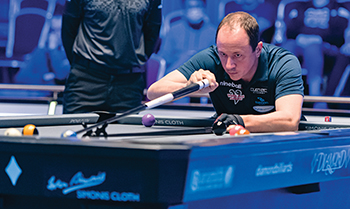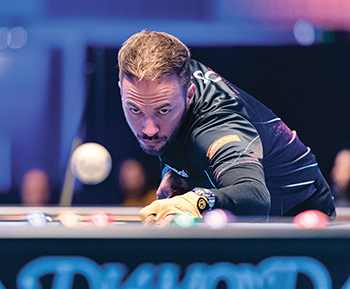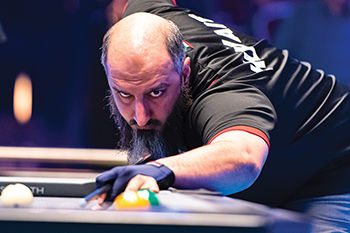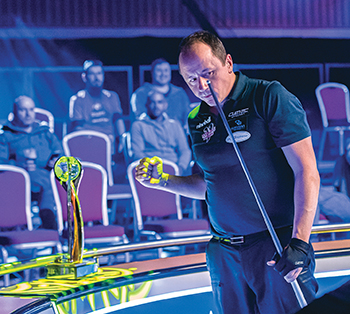No Worlds Left to Conquer
At 38, American Shane Van Boening finally claimed the one title missing from his trophy case — the World Pool Championship.
By Keith Paradise
Photos by Taka Wu
The night before the final day of competition in the World Pool Championship, Shane Van Boening slept like a baby — and maybe that should have been his indication.
“I felt like I slept the best that I ever could before the finals,” said “I just had a feeling that I was going to do well that day.”
Near the end of previous World 9-Ball Championships, Van Boening tossed and turned his way to something that resembled a couple of hours of sleep on paper but wasn’t particularly restful. This time, the 38-year-old American star guesstimated that he grabbed 10 hours of rest before rising for the final two rounds of play Sunday morning at Stadium MK in Milton Keynes, England.
Then again, nothing about this tournament had been going the way it had gone in previous years, so why should rest be any different? Throughout the five-day, 128-competitor event, Van Boening seemed to get just the right break at just the right time — or, as was the case in his round of 16 match against Ko Pin Yi, back-to-back breaks at just the right time. Whenever it seemed a player was about to take command against the South Dakotan, an untimely error would occur. Conversely, whenever Van Boening had a chance to seize on an open opportunity he rose to the occasion and shot more precisely than a Swiss timepiece.
Van Boening said he felt like a new person when he woke up and, by the end of the day, he was definitely a different one; a person who could finally add the title “world champion” as a prefix to his name, having survived a nip-and-tuck battle in the first half of his match with defending champion Albin Ouschan only to have another one of those momentum swinging shots lead to winning eight straight racks and coasting to a 13-6 victory. The World Pool Championship title, a title which had eluded the South Dakotan for a decade and a half, puts an exclamation point on a career that includes five U.S. Open 9-Ball Championships, four Derby City Classic 9-Ball titles, a pair of World Pool Masters crowns and more than a dozen U.S. Open 8-Ball and 10-Ball titles. Even before this championship, the only thing that was keeping him out of the Billiard Congress of America Hall of Fame is the fact that he’s too young, still three years from earning a spot on the ballot.
“I only have one thing left to say,” Van Boening said on the Tuesday after his victory. “That monkey is no longer on my shoulder.”
It was a monkey that had been there for so long and had been fed so often by Van Boening’s detractors that the primate could probably run a couple of balls himself. Sure, they’d say, “He’s won a lot in America but what about his record in world championships?”, completely overlooking the fact that Van Boening was one of the few American competitors at that time willing to challenge himself in international events. In consecutive years, Van Boening lost in the final, losing to Pin Yi Ko in 2015 and to Albin Ouschan the following year. In 2018, he finished third. Even in last year’s World Pool Championship, Van Boening appeared to be cruising along in the single-elimination phase when sparring partner Oliver Szolnoki came from behind to eliminate him in the round of 16. With younger players joining the circuit every year, it was understandable for American pool fans — and even Van Boening himself — to wonder if the window of opportunity was either beginning to close or had already been shut.
Van Boening opened double-elimination play with routine victories against Waleed Majid, 9-4, and Jan Van Lierop, 9-6, but struggled against Bahran Lofty in the opening round of single-elimination play, using a couple of pocketed 9 balls on the break gut out an 11-9, win. And when a resurgent Mika Immonen built a commanding 10-3 advantage in the race-to-11 round of 32, it looked like Van Boening’s chances for a championship would have to wait for another year.
“I thought it was over,” he said. “I was pretty much done.” As Immonen worked to clear the table in what could have been the final game, the 3 and 4 balls remained clustered in a corner. The former World 9-Ball Champion cut in the 3 ball and crisscrossed the cue ball across the table to try and land an angled position on the 4 ball. Instead, he bumped the object ball and left himself a straight-in shot down the rail, eliminating any hope of moving the cue ball to the other side of the table for position on the 5 ball, which Immonen ultimately overcut and missed.
“That’s when I told myself I’m not giving up,” said Van Boening. After a victorious safety exchange allowed him to cut the deficit to 10-4, the South Dakotan used back-to-back breaks and runs to chop the lead to 10-6. He would miss the 3 ball in the 17th rack but watched the cue ball roll to a safe spot, forcing his opponent to try a jump shot. After Immonen missed his attempt, Van Boening cleared the table once again to trim the lead to 10-7.
It seems no championship run in any sport is complete without some form of controversy or point of contention. Pool, with its myriad of breaking and racking rules, is rarely an exception to the rule. After Van Boening broke the balls in the 18th game, the official approached the table to remove the template rack that was being used in the tournament’s earlier rounds. The 9 ball settled near the plastic sheet, with the 1 ball slightly behind and to the side of it. Van Boening said the object ball was slightly hidden by the 9 but that he could see one-quarter of the ball. Rather than use a ball marker to mark the area where the 9 ball was, the referee opted to simply pick the ball up and place it back down again, much to the disdain of Immonen, who grumbled noticeably after Van Boening cleared the table to narrow the gap to 10-8. Van Boening, who was unintentionally blocking Immonen’s view of the table after the break, stated the 9 ball was placed back in its proper spot.
“You can’t really say that if you didn’t really see the 1 in the first place,” said Van Boening.
Immonen, meanwhile, said his main complaint was about officials touching and moving balls without the aid of a ball marker. Immonen took time prior to the next break to voice his displeasure with the referee. Viewers on social media immediately chastised Immonen for his protest.
“I just can’t fathom the audacity that people have,” Immonen said. “I just wanted to make a point that I don’t want him touching the balls without a marker.”
Van Boening forced an Immonen foul in the next game to trim the deficit to a single rack. Van Boening was feeling it. When he muffed position on the 7 ball by accidentally kicking the 9 ball into its path in the 20th game, he simply executed a rail-first cut shot to pocket the ball in the corner pocket to tie the match, 10-10. After breaking in the deciding rack, Van Boening executed a sharp cut shot on the 1 ball, a dicey 4 ball with the cue ball pinned to the rail, then hammered in a punch on the 5 ball that allowed him to crack a joke with the crowd when it landed. He finished off the rack to advance to the round of 16 while his opponent packed up his cues and wondered what could have been.
“I basically missed one ball and played two jump shots and two kick shots,” said Immonen. “If I get good position on the 4, I’m clear out. One positional error cost me the match. I just want that match to be remembered for the quality of play and not the questionable little details.”
Van Boening had survived to the final 16 but still wasn’t playing as well as he was capable of. Reflecting on his matches, Van Boening said he realized he’d forgotten a key ingredient: fun.
“I forgot that I need to have fun when I go and play in all of these tournaments,” he said. “To just take away the pressure on yourself and getting out there and playing the table and playing your game.”
He was given a bit more advice during the event that proved crucial. The morning after Van Boening’s comeback victory against Immonen, he had breakfast with longtime sparring partner Jeff Beckley. As they shared a long chat, Beckley reminded his old friend to stay positive and maintain composure throughout the whole match.
He would need all the positivity he could muster down the stretch as his route would include former world champion Pin Yi Ko, Jung-Lin Chang, considered among the best rotation players in the world, reigning World Pool Masters champion Alex Kazakis and defending World Pool Champion Ouschan. If a Hollywood writer had submitted this script, it would have been rejected as being over-the top as each competitor held some significance to Van Boening. Ko and Ouschan had both defeated the South Dakotan in world 9-ball finals, while Kazakis whitewashed Van Boening in the finals of the 2021 Masters, 11-0.
Opening the day against Ko, again Van Boening watched his opponent build an early lead, as the former World 9-Ball and World10-Ball champion led, 7-4, and was in the process of adding to his total with an open table. Once again, a fortuitous miss allowed the American back to the table. Van Boening completed the rack, then rifled in back-to-back 9 balls on the break to tie the match. From there, he ran through the final three games to gut out an 11-8 win.
“That’s pool,” said Van Boening. “I didn’t give up and just played the best I could, but he made more mistakes than I did, and I just took advantage of his mistakes.”
Next up was Chang, who won the International Open in 2018 and the Las Vegas Open 10-Ball tournament in 2020 but has experienced similar struggles in world championships. He reached the finals of the 2019 World 9-Ball but got bogged down by pressure and lost to Fedor Gorst. Van Boening also played the 36-year-old from Chinese Taipei in a gambling match last year in Texas and watched the effects pressure had on his opponent during the multi-day event. Van Boening’s plan was simply to get ahead early and watch the stress devour Chan, which is exactly what happened. Van Boening built leads of 5-2 and 7-3. Chang whittled away at the deficit both times and even cut the lead to 10-8 before handing the table back to Van Boening and losing, 11-8. Van Boening was heading to the semifinals the next day to face Kazakis (who had survived a hill-hill match against Szolnoki in the quarterfinals) and to bed for that good night’s sleep.
Playing in the second semifinal match of the morning, the American recovered from an early 3-2 deficit to jump out to a comfortable 8-3 lead. The Greek wasn’t finished, fighting back to cut the lead to 8-7.
With a chance to tie, Kazakis unleashed a powerful break which pocketed six balls. The problem for him was that one of those was the cue ball. Van Boening cleared the table to climb ahead 9-7, then used one more break-and-run and a combination shot to squeak out an 11-7 victory and earn his third shot at the title.
“Shane is an amazing player and very tough to beat,” said Kazakis. “I had some weird breaks that helped me to lose in that match but, overall, he played amazing against me.”
Heading into his championship match against Ouschan, Van Boening said he felt confident. He believed he was breaking better and had put together more multi-rack packages than anyone else. Add in the fact that the winner breaks format, changed from the previous year’s alternate break setup, favors a player like Van Boening and it was easy to see why he was feeling good about his chances.
That said, Ouschan didn’t win back-to-back Premier League Pool events, last year’s World Pool Championship and the International Open on good rolls alone. In fact, if anyone was playing better down the stretch in Milton Keynes, it was the Austrian. After opening with easy victories against Lo Ho Sum and Daniel Maciol, Ouschan gutted out an 11-6 win over Nicholas De Leon and an 11-8 decision against Mats Schjetne to secure his spot in the final 16.
From that point, the two-time World 9-Ball champion made it look easier and easier as he went, cruising past Thorsten Hohmann 11-5 and taking out Joshua Filler, 11-6, to advance to the semifinals where he met Abdullah Alyousef, a 20-year veteran who was following a similar pattern to countryman Omar Al Shaheen a year earlier. Last year Al Shaheen’s runner-up finish to Ouschan in 2021 was a watershed moment for players from the Middle East. This year it was Alyousef’s turn, as he upset Aloysius Yapp and Max Lechner to reach the final four.
“After Omar’s performance last year, a lot of things changed in Kuwait,” Alsousef said. “It motivated a lot of players, and the game grew up more and more.”
Unfortunately for Alyousef, Ouschan picked the semifinals to play perhaps his best match of the event, breaking and running four times in eight racks to build a commanding 8-0 advantage. The Kuwaiti cut the deficit to 8-3, but missed in the next game, allowing Ouschan to coast to an 11-3 win to secure a spot in the final.
“I put some pressure on myself because I was the person that people wanted to beat,” said Ouschan. “I played good enough to beat my opponent in most of my matches but when I got into the knockout stage I played better and better every game.”
In the title match, Ouschan took advantage of some early jitters by Van Boening to build a 4-2 lead. But theAustrian scratched on the break in the seventh rack and Van Boening cleared the table and tacked on a break-and-run to tie the match, then used a combination shot on the 9 ball to grab the lead.
Throughout the day, Van Boening had been experimenting to see which side of the table was better for breaking. Generally, he favors the right side but was struggling to put balls away from that area of the table throughout the day. In fact, two dry breaks against Kazakis allowed the Greek back into the match. So, when he broke in the 10th rack, watched as nothing fell, then sat and watched while Ouschan cleared the table to tie the score, a tactical decision was made.
“When I had a couple of dry breaks that’s when I said to myself, ‘I’m not breaking from this side anymore,” Van Boening said.
Now he just had to earn an opportunity to break again. The Austrian had laid down a safety which he was certain had locked up his opponent. Van Boening assessed the table, then unleashed a medium speed, one-rail kick which pocketed the 1 ball, then used a safety on the 2 ball to work his way out of the rack and tie the score, 6-6.
“That’s a kick you probably make one in 20 times at that speed,” said Ouschan. “After he made that I kind of said to myself, ‘God damn. What’s going to happen next?’”
Little did Ouschan know at that time that he wouldn’t really see another good opportunity. Van Boening earned seven consecutive racks to coast into the title, putting on a display of clutch shot-making and suffocating safety play down the stretch. He rolled to an 11-6 lead, while Ouschan could only look on with a bemused look on his face.
“I know the feeling when every detail goes your way,” he said. “I knew the chances of me making a comeback were very small.”
With the lead now 12-6 and a rack away from victory, Van Boening executed a push out on the 1 ball after the break. Rather than risk a miss or selling out the table to his opponent, Ouschan returned the table to Van Boening.
“I was surprised he gave that back because that was an easy kick safe,” said Van Boening.
“I had been sitting in my chair for 25 minutes,” said Ouschan. “The chances of me leaving a good safety were very small.”
After a Van Boening safety, Ouschan returned to the table and jumped in the 1 ball, only to leave himself another jump on the 2. The long jump resulted in both the 2 and the cue ball leaving the table, handing Van Boening ball-in-hand. As he worked his way through the final balls, Van Boening admitted that his emotions started to leak to the surface. A ball away from victory, Van Boening called for his attention and walked over to the championship trophy perched on a table in the corner of the playing arena. He reached toward the trophy and said to himself, “This trophy is mine.”
After pocketing the championship-winning ball (becoming the first American since Earl Strickland in 2002 to claim the title) and shaking hands with Ouschan, Van Boening climbed onto the Diamond table and let out a series of screams that had been over a decade in the making.
“I’m happy for him,” said Ouschan. “I know that he’s suffered a lot with the two finals in a row that he lost. After the match I saw his relief and I know how he felt. He did a great job and he’s a well-deserved winner.”
The day after his championship, Van Boening upgraded his flight home to first class, had a more than modest number of adult beverages at the airport bar and headed home — again, sleeping like a baby. Of course, it’s a little bit easier to sleep when there’s no longer a monkey on your back.
“That monkey has gone back into the forest,” Van Boening said with a laugh.





